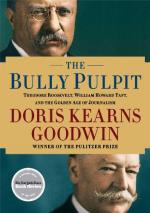|
This section contains 381 words (approx. 1 page at 400 words per page) |

|
The Bully Pulpit: Theodore Roosevelt, William Howard Taft, and the Golden Age of Journalism Summary & Study Guide Description
The Bully Pulpit: Theodore Roosevelt, William Howard Taft, and the Golden Age of Journalism Summary & Study Guide includes comprehensive information and analysis to help you understand the book. This study guide contains the following sections:
This detailed literature summary also contains Quotes and a Free Quiz on The Bully Pulpit: Theodore Roosevelt, William Howard Taft, and the Golden Age of Journalism by Doris Kearns Goodwin.
In the early years of the 20th Century, Theodore Roosevelt and William Howard Taft formed a political and personal alliance that reconfigured American history. Their effectiveness was amplified by a working relationship with muckraking journalists, but Taft and Roosevelt then drifted apart and become enemies—never to fully reconcile.
The author describes Taft as the more scholarly, careful politician whose real ambition was to sit on the Supreme Court. Although a large, physically imposing man, Taft was gregarious but a bit shy, given to long-winded and often boring public speeches. Roosevelt, perhaps overcompensating for childhood fragility, presented himself as a "Rough Rider" or rugged specimen of outdoor manhood with big ideas, big power and big connections. Roosevelt's speeches were fiery where Taft's were innocuous, his viewpoints on social and ethical issues sharply defined. Together, theirs was a symbiotic relationship to which each man brought considerable strengths——Roosevelt as mentor and political guide, Taft as the slow but certain voice of reason and moderation.
Their partnership grew and flowered until their differences became more liabilities than assets, when Roosevelt decided to seek another term as president because of what he saw as Taft's ineffectual, self-effacing presidential leadership. Their clash was mostly about style rather than substance: they both continued to espouse the same ideas for change although Roosevelt was ready to push harder for progressive change than Taft, and thus was born the short-lived Bull Moose Party. Although the labels shifted, the ideas for change remained to be picked up by other men, another political party, after the election of Democrat Woodrow Wilson.
The book shows how the rift between Roosevelt and Taft seemed driven by hubris—overbearing pride and ego—on Roosevelt's part. And the paradox is that, without his zeal and self-confidence, Roosevelt might not have been able to accomplish as much as he did otherwise. Sam McClure, publisher of the very influential McClure's Magazine, on the other hand seems to have been driven to accomplishments that supported the progressive movement by his own bipolar illness — which ultimately proved to be his undoing. But during the heyday of McClure's Magazine investigative journalists such as Ida Tarbell, Lincoln Steffens and William Allen White supported - and sometimes supercharged - the progressive agenda of both Roosevelt and Taft.
Read more from the Study Guide
|
This section contains 381 words (approx. 1 page at 400 words per page) |

|



